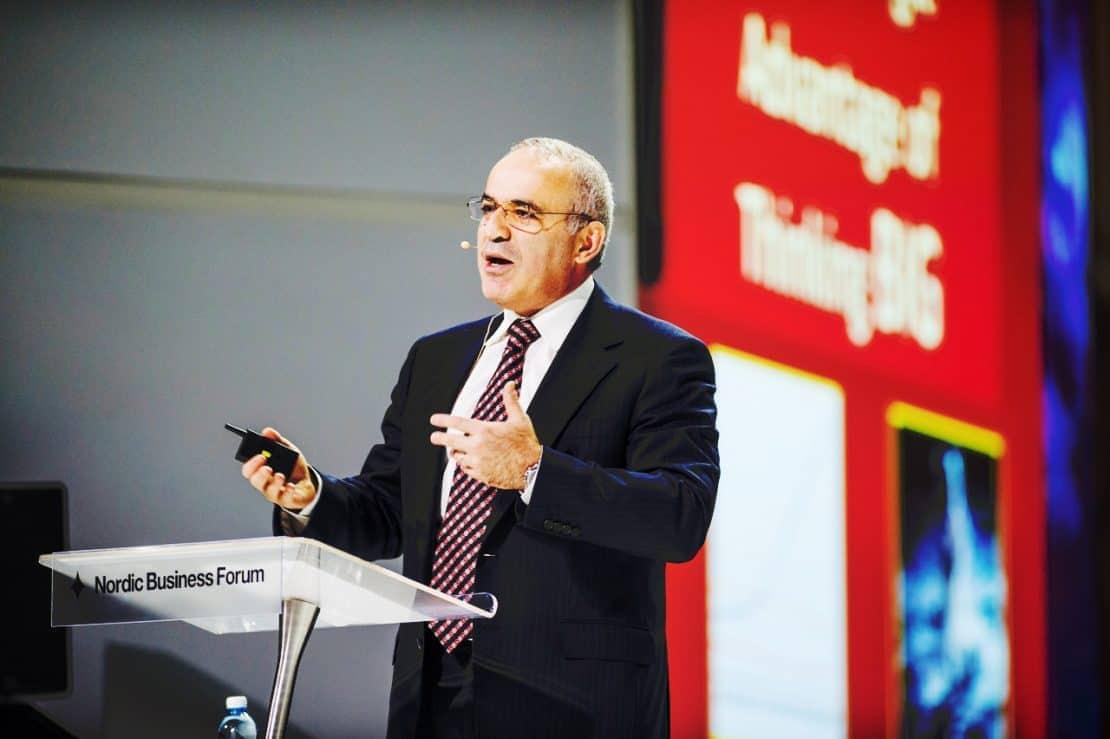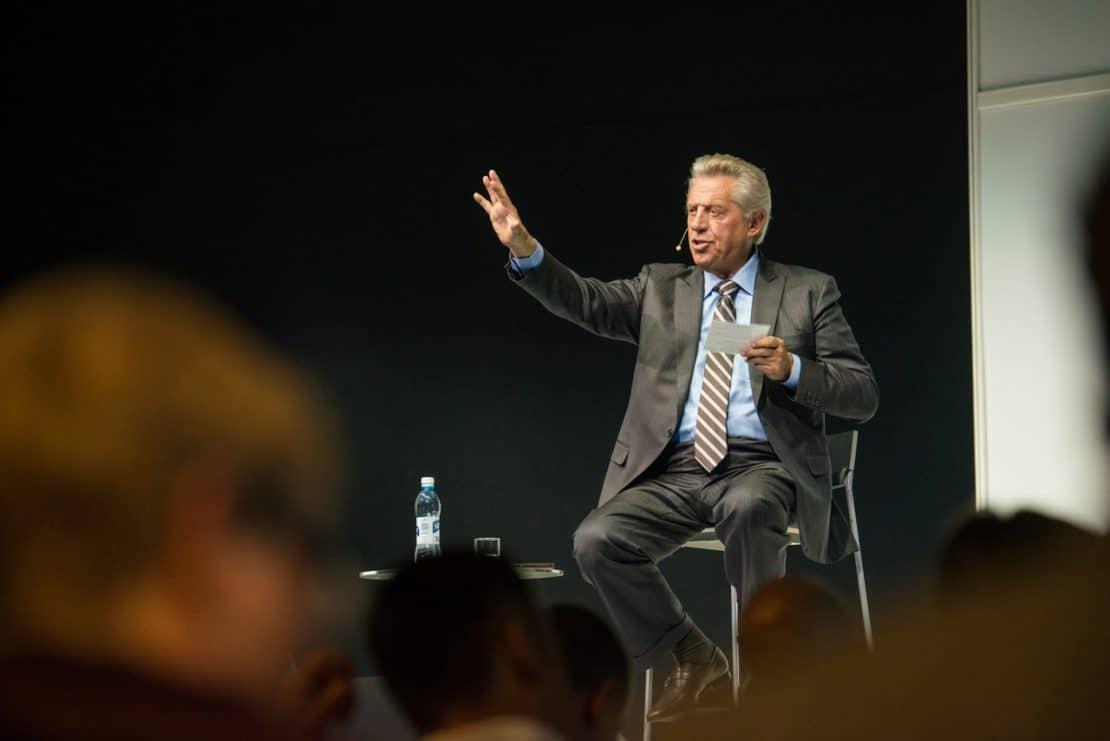17Dec2015
The chess champion urged the crowd to become more self aware by learning from both victories and failures. Risks are often worth taking.
Back in 1939, underdog Finland knew it was taking a terrible risk standing up to the vast power of the Soviet Union to defend its independence. History has since shown that the risk was well worth it. Speaking during Nordic Business Forum 2015, chess grandmaster Garry Kasparov used the example of the Finno-Russian war to illustrate that taking risks often pays off and ensures we don’t stand still.
Russian chess guru Garry Kasparov knows a thing or two about strategy. The veteran of the intellectual sport became the youngest chess master at the age of 22 in 1985 and remained at the pinnacle of the game for a further 20 years. During that time Kasparov pondered and committed to more than 89,000 moves on the chessboard.
Decision-making is personal
During his address Kasparov touched on key aspects of strategy, including personality, circumstance, analyzing failure, looking at the big picture, risk taking and grasping opportunity to mold the future.
The strategic thinker told the attendees of the forum that chess is all about decision-making, and further, that decision-making is as unique and personal as an individual’s fingerprints or DNA.
“So the key to making good decisions is to understand yourself,” Kasparov counseled.
As a result each individual’s personal substance dictates his or her personal style and approach to decision making.
Circumstances determine strategy
The master strategist took listeners back to the middle ages to illustrate the strategy of forcing opponents to engage based on a particular set of circumstances.
During those times, battle plans centered on the terrain at hand: cavalry were best suited to even plains, while archers would be deployed over mountainous terrain. However, he noted that despite the best of battle plans, many crucial decisions are still made in the midst of crisis.
Ask the right questions, analyze failures
Human intuition is also essential for astute decision making, as is the ability to pose the right questions Kasparov argued.
“Asking the right question helps us to find our way through the vast amount of information available online,” the chess master explained.
He said that the example supports the thesis that human intervention is required in mass computing to make sense of it. At the same time, human judgment is prone to inaccuracies due to a number of factors such as concentration or lack thereof, history, or habit.
Winners, not only losers, must therefore analyze past performances, as this is the key to progress and to improving in the next encounter.
Don’t forget the big picture
For his next set of observations on strategy, the author and human rights activist invited participants to consider a number of well-known companies, past and present.
He compared the Wright Brothers, who engineered the first winged aircraft, with Boeing, the US multinational aviation company; now-defunct data processing and computer pioneer Wang Labs with Toshiba; early search engine AltaVista with today’s Google; and Finnish mobile phone maker Nokia with Apple and its hugely popular iOS-based consumer products.
Kasparov noted that all of the comparisons featured companies that had once been market leaders that lost their grip on the top position, and those that later became leaders in the same markets. He said that companies such as Google and Apple were able to overtake the leaders because of their ability to see the big picture and to take risks.
“Leaders are infected by the gravity of past success,” Kasparov cautioned.
He paraphrased and extrapolated the “incompleteness theorem” of the Austrian-American mathematician and philosopher Kurt Gödel to illustrate the inherent pitfalls of being in the position of a leader.
Every system will contain a problem that cannot be solved from within the system itself.
What that means Kasparov said, is that no matter how far we go horizontally, at some point we will be unable to find solutions from within the existing framework. Escaping the confines of the framework will require a vertical move, which is all about taking risks and leaving behind a comfort zone.
Risk is always worth taking
Kasparov next considered the role of risk taking in strategy. In a business setting, he said, if it is possible to determine time and cost, then an idea is already obsolete.
It is the act of stepping into the unknown – taking a risk – that opens up new opportunities and markets. The grandmaster revisited historical events in Finland, Russia and Estonia to prove his thesis that risk is always worth taking, even at the political level.
Kasparov reminded the audience that faced with Soviet domination or a seemingly futile struggle to hold on to independence in 1939, tiny Finland took on the risk of being crushed by the mighty Red Army and losing out on the gamble. The cost to the Finns was great – roughly 26,000 lives were lost. But the reward was maintaining its independence.
“What were the chances of tiny Finland – 75 years ago – to resist Soviet aggression? No tanks, no aviation… Was it more appropriate to give up and to save lives?” Kasparov asked.
According to Kasparov, other Baltic states such as Estonia, Latvia and Lithuania did just that. They weighed the risks, decided the odds were insurmountable, and bowed to Soviet Russia. The decision to avoid risk was rewarded with a far greater loss of life than the Finns suffered, in addition to 50 years of Soviet occupation.
“The odds were against you and you didn’t care, because you knew there was something more important than calculating the odds,” the activist said to the mainly Finnish audience.
The lesson he said, “When we’ve reached the point where we can see the bigger picture, then we understand that risk is always worth taking because that’s what moves us forward.”
The Russian chess master pointed out that in today’s environment even the smallest mistake can kill a product. Yet even if there is a 50-50 chance of succeeding in going to Mars, humans will take the risk.
“Let’s not be afraid to move forward,” he asserted.
World on the cusp of major opportunity
In the Q&A session that followed his keynote address, Kasparov said that the global community commands a great deal of resources for bringing about change.
“The free world has the military, economic, even the political advantage, yet we’re still trying to play it safe. The bad guys see this as a weakness,” the strategist warned.
He called for a new vision for the future, similar to the sentiment that held sway at the end of World War Two in 1945, noting that the United Nations’ current mandate of freezing war is no longer relevant.
“We need an institution to solve problems. We have big opportunities and resources but we need the right institutions to take advantage of these opportunities,” Kasparov urged.
He also pointed out that humanity seemed to be stuck in a rut, with long-established technologies such as the combustion engine still in use.
“We can have vertical development if we want, we just need the goals,” he noted, recalling a 1962 pledge by deceased US President John F Kennedy to put a man on the moon. That promise was fulfilled just seven years later, Kasparov pointed out.
He noted that all of this was accomplished with far less computing power than the average smartphone user carries in his or her pocket today.
The business speaker and author said that wars have spawned some of mankind’s greatest innovations. However more conflict is not what’s needed now, he said.
“We’re at a point when the decisions we make today will have great future impact. It is similar to chess, where a crucial move can affect many moves to come,” Kasparov commented.
The strategic thinker said it is now up to individuals as well as global organizations and governments to consider the next collective move. He closed with a challenge, referencing the wildly popular Angry Birds game produced by Finnish game studio Rovio.
“You have a choice [how] to use the device in your pocket – which has so much computing power – to take a man to the moon and back, or you can keep throwing birds at pigs,” the master strategist concluded provocatively.
Garry Kasparov is a business speaker and author, human-rights activist and former World Chess Champion. He came to international fame as the youngest world chess champion in history at the age of 22. He is currently on the board of directors for the Human Rights Foundation and chairs its International Council.


